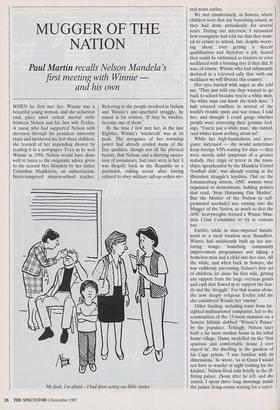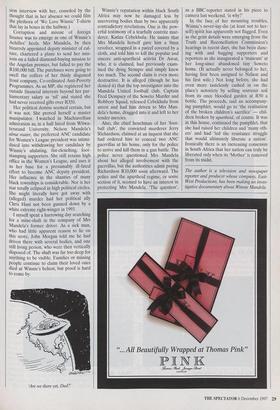MUGGER OF THE NATION
Paul Martin recalls Nelson Mandela's
first meeting with Winnie - and his own
WHEN he first met her, Winnie was a beautiful young woman, and the seduction took place amid violent marital strife between Nelson and his first wife Evelyn. A nurse who had supported Nelson with devotion through his penniless university years and mothered his first three children, she learned of her impending divorce by reading it in a newspaper. Even as he wed Winnie in 1958, Nelson would have done well to listen to the enigmatic advice given to the second Mrs Mandela by her father Columbus Madikizela, an authoritarian, fierce-tempered mission-school teacher. Referring to the people involved in Nelson and Winnie's anti-apartheid struggle, he stated in his oration, 'If they be witches, become one of them.'
By the time I first met her, in the late Eighties, Winnie's 'witchcraft' was at its peak. The arrogance of her township power had already eroded many of the fine qualities, though not all the physical beauty, that Nelson, and a dizzying succes- sion of paramours, had once seen in her. I was illegally back in the Republic as a journalist, risking arrest after having refused to obey military call-up orders sev- `My fault, I'm afraid – I had them acting out Bible stories.' eral years earlier.
We met clandestinely, in Soweto, where children were that day boycotting school, as they had done periodically for several years. During our interview, I recounted how youngsters had told me that they want- ed to return to school, but, despite worry- ing about ever getting a decent qualification and therefore a job, feared they could be victimised as traitors or even necklaced with a burning tyre if they did. It was, of course, Winnie who had infamously declared in a televised rally that 'with our necklaces we will liberate this country'.
Her eyes burned with anger as she told me, 'They just told you they wanted to go back to school because you're a white man. No white man can know the truth here.' I had covered conflicts in several of the world's trouble spots and war zones, I told her, and thought I could gauge whether people were conveying their genuine feel- ings. 'You're just a white man,' she ranted, `and whites know nothing about us!'
While her high-handedness and arro- gance increased — she would sometimes keep foreign VIPs waiting for days — they were merely mild symptoms of a greater malady. Her reign of terror in the town- ships, spearheaded by the Mandela United `football club', was already tearing at the liberation struggle's loyalties. Out on the Johannesburg streets, ANC women were organised to demonstrate, holding posters that read, 'Stop Harassing Our Mother'. But the Mother of the Nation (a self- promoted accolade) was turning into the Mugger of the Nation, so much so that the ANC heavyweights formed a Winnie Man- dela Crisis Committee to try to restrain her.
Earlier, while in state-imposed banish- ment to a rural location near Brandfort, Winnie had assiduously built up her nur- turing image, launching community improvement programmes and taking a homeless man and a child into her care. All the while, and when back in Soweto, she was ruthlessly preventing Nelson's first set of children, let alone his first wife, getting any support from the large overseas grants and cash that flowed in to support the fam- ily and the 'struggle'. For that reason alone, the now deeply religious Evelyn told me she considered Winnie her 'enemy'.
Other funding, including some from far- sighted multinational companies, led to the construction of the 15-room mansion on a Soweto hillside dubbed `Winnie's Palace' by the populace. Tellingly, Nelson later built a far more modest house in his tribal home village, Qunu, modelled on the 'first spacious and comfortable house I ever stayed in', the dwelling in the gardens of his Cape prison. 'I was familiar with its dimensions,' he wrote, `so at Qunu I would not have to wander at night looking for the kitchen.' Nelson lived only briefly in the ill- fitting palace. (Soon after he left, and she stayed, I spent three long mornings inside the palace living-rooms waiting for a televi- sion interview with her, consoled by the thought that in her absence we could film the plethora of 'We Love Winnie' T-shirts that lay in boxes in the hallway.) Corruption and misuse of foreign finance was to emerge as one of Winnie's Achilles' heels. Mrs Mandela, by then bizarrely appointed deputy minister of cul- ture, chartered a plane to send her min- ions on a failed diamond-buying mission to the Angolan premier, but failed to pay the R100,000 bill. The purchases were going to swell the coffers of her thinly disguised front company, Co-ordinated Anti-Poverty Programmes. As an MP, she registered her outside financial interests beyond her par- liamentary salary as 'nil' and stated she had never received gifts over R350.
Her political demise seemed certain, but it was not. She proved herself a master manipulator. I watched in Machiavellian admiration as, in a hall hired from Witwa- tersrand University, Nelson Mandela's alma mater, the preferred ANC candidate for Women's League president was intimi- dated into withdrawing her candidacy by Winnie's ululating, fist-clenching, foot- stamping supporters. She still retains high office in the Women's League, and uses it as her base for a presumably ill-fated effort to become ANC deputy president. Her influence in the shanties of many black townships is considerable. Nor is her star totally eclipsed in high political circles. She might literally have got away with (alleged) murder had her political ally Chris Hani not been gunned down by a white extreme right-winger in 1993. I myself spent a harrowing day searching for a mine-shaft in the company of Mrs Mandela's former driver. As a sick man, who had little apparent reason to lie on this score, John Morgan told me he had driven there with several bodies, and one still living person, who were then vertically disposed of. The shaft was far too deep for anything to be visible. Families or missing people continue to claim their loved ones died at Winnie's behest, but proof is hard to come by.
Are we there yet, Dad?' Winnie's reputation within black South Africa may now be damaged less by uncovering bodies than by two apparently contradictory revelations. One is the pow- erful testimony of a tearfully contrite mur- derer, Katiza Cebekhulu. He insists that Mrs Mandela herself gave him a 9mm revolver, wrapped in a parcel covered by a cloth, and told him to kill the popular and sincere anti-apartheid activist Dr Asvat, who, it is claimed, had previously exam- ined the dying Stompie and simply knew too much. The second claim is even more destructive. It is alleged (though he has denied it) that the top investigator into the Mandela United football club, Captain Fred Dempsey of the Soweto Murder and Robbery Squad, released Cebekhulu from arrest and had him driven to Mrs Man- dela's home, dragged into it and left to her tender mercies.
Also, the chief henchman of her 'foot- ball club', the convicted murderer Jerry Richardson, claimed at an inquest that she had ordered him to conceal two ANC guerrillas at his home, only for the police to arrive and kill them in a gun battle. The police never questioned Mrs Mandela about her alleged involvement with the guerrillas, but the authorities admit paying Richardson R10,000 soon afterward. The police and the apartheid regime, or some section of it, seemed to have an interest in protecting Mrs Mandela. 'The question', as a BBC reporter stated in his piece to camera last weekend, 'is why?'
In the face of her mounting troubles, Winnie's never-say-die (at least not to her- self) spirit has apparently not flagged. Even as the grim details were emerging from the Truth and Reconciliation Commission's hearings in recent days, she has been danc- ing with and hugging supporters and reporters as she inaugurated a 'museum' at her long-since abandoned tiny Soweto home. (It actually never belonged to her, having first been assigned to Nelson and his first wife.) Not long before, she had even more tastelessly cashed in on the place's notoriety by selling souvenir soil from its once bloodied garden at R50 a bottle. The proceeds, said an accompany- ing pamphlet, would go to 'the realisation of the broken children's sacrifice' — chil- dren broken by apartheid, of course. It was in this house, continued the pamphlet, that she had raised her children and 'many oth- ers' and had 'led the resistance struggle that would ultimately liberate a nation'. Ironically there is an increasing consensus in South Africa that her nation can truly be liberated only when its 'Mother' is removed from its midst.
The author is a television and newspaper reporter and producer whose company, East- West Productions, has been making an inves- tigative documentary about Winnie Mandela.



















































































 Previous page
Previous page